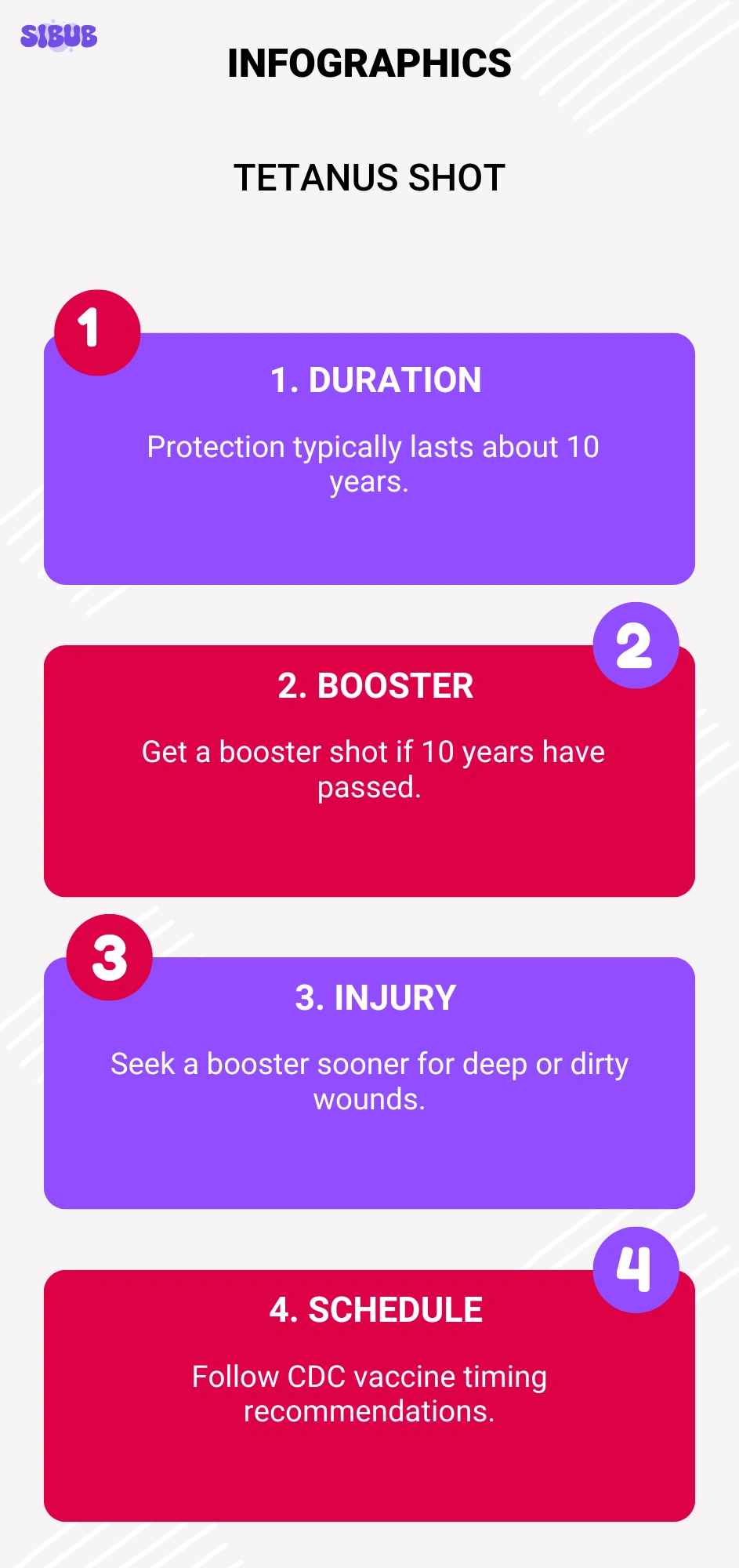You have probably heard someone say, Have you had your tetanus shot?
After stepping on a rusty nail or getting a deep cut. This is because tetanus is a severe infection, and it is only through the use of the tetanus vaccine that one can protect against it.
Read along, and here are the things you should know about the tetanus shot in this simple-to-comprehend guide: what it is, how long it lasts in the system, what to expect after getting the vaccine, and when to have a repeat shot.

Be it’s going to school, travelling out of the country, or simply maintaining your immunizations, it is all answered in this blog.
What Is Tetanus?
Tetanus is an infection that is caused by bacteria that live in soil, dust, and manure. Once it gets inside a body through the incision or wound, it may lead to painful muscle rigidity and lockjaw. This is why the symptoms of tetanus normally tend to start with jaw spasms or difficulty in swallowing.
Tetanus is a disorder that, without therapy, may result in respiratory malfunction, convulsions, and even death.
The good part is the fact that tetanus immunisation can protect you even before this happens.
What is Tetanus Shot?
Tetanus vaccine is called a tetanus shot, and it protects you from this infection.
It is most commonly given with other vaccinations to include, including diphtheria and pertussis (whooping cough).
The following are some of the most frequent pairings:
- TaP – children of early ages
- Tdap for Older children and adults
- Td-adult booster
The tetanus injection causes your body to produce antibodies that will combat the tetanus symptoms in case you get infected with the bacteria.
How long are tetanus shots good for?
People, probably many of them, ask this question: How long does a tetanus shot last?
The obvious one: Tetanus immunization tends to be good (on average) for 10 years.
In order to be safe, you have to have a booster after 10 years. But, in case of a deep or dirty wound, and it has been more than 5 years since the last tetanus immunization, chances are that you are advised to have another shot of immunization by your doctor just in case.
Thus, considering how long tetanus shots last, one should recall:
- A decade of normal protection
- 5 years in case you have a dangerous sore
Who is required to have a Tetanus Vaccination?
Tetanus immunization is required for everyone throughout their lifetime:

- The DTaP vaccines are administered to babies as a series beginning as early as 2 months.
- It is also recommended that adolescents be given a supplement of Tdap at the age of 11 years or 12 years.
- Adults have to use the TD booster once every 10 years
- The Tdap shot should be administered during every pregnancy in the case of a pregnant woman.
Ask your physician or go through your vaccination record to determine when you last got the tetanus injection in case of doubt.
What are the symptoms of Tetanus?
The most widespread tetanus symptoms are as follows:
- Jaw spasms or lockjaw
- Muscle (neck, back, abdomen) rigidity.
- Rigidity of muscles (neck, back, abdomen)
- Trouble swallowing
- Temperature and perspiration
- Seizures and Spasms
The treatment of tetanus should commence soon. The disease is very difficult to treat once the symptoms show up and may last weeks or months.
Tetanus treatment
In case of the development of tetanus, you will require:
- Tetanus immune globulin (against the toxin)
- Antibiotics
- Medicines such as muscle relaxants or sleeping pills
- Breath support possibilities (a startling case)
It is for this reason that your tetanus vaccine is so very important to get in time. Tetanus can be treated, but it is safer and easier to prevent it.
Side effects of the tetanus Vaccine
Side effects of the tetanus shot are mild to most people and include:
- Sore arm
- Injection site swelling
- Mild fever
- Fatigue
Side effects are also rare and severe in the first three months of taking the medication, and therefore, despite the medication being used, it is important to consult the doctor in case of any allergic side effects (such as problems when breathing and swelling of the face)
What time is best to get a Booster?
To remain safe:

- Take the tetanus vaccine once in 10 years
- On a soiled wound, follow up with a booster, 5+ years later
- During pregnancy, pregnant women ought to obtain Tdap in every pregnancy
- The schedule also keeps your body prepared to combat tetanus-causing bacteria.
Quick Summary
- What is tetanus? A bacterial condition that leads to stiffness of muscles.
- What is a tetanus injection?A tetanus vaccine that would safeguard you.
- How long does tetanus vaccine last? 10 years or 5 years in case of a dangerous incision.
- What are the symptoms of tetanus?Stiffness of muscle, Lockjaw, and spasm.
- What is the treatment for tetanus? Immunoglobulin, antibiotics, and supportive treatment.
Who does it need? Everybody is susceptible, babies, kids, adults, and pregnant women.
For more information, visit Sibub.
